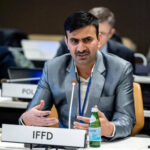
Social Policies and
the Role of the Family
Shape the Well-being of Individuals and Communities
by Providing the Care and Support they Need
Into the Preparations and Follow up of the
Second World Summit for Social Development
IPC – Facultés libres de philosophie et de psychologie
70 Avenue Denfert-Rochereau, 75014 Paris
New dates for this year
9-13 June 2025
[From Monday evening to Friday morning]
The event will be on-site only, and no online participation will be available

The key document that serves as a basis for the zero draft political declaration that will be the primary outcome of the Summit includes, among the fields of actions that have been identified, “social policies and the role of the family: emphasizing the need to create and adapt existing social policies on care and support systems, applying a holistic social development approach, which integrates the role of the family, in providing care and support to its members, as an enabler of and contributor to social development.”
[Food for Thought Paper for the Second World Summit for Social Development]
The Workshop is an ideal opportunity to get to know international organizations from the inside and learn about internships at the United Nations in direct contact with IFFD representatives.

The venue goes back to Paris this year, an excellent place for academic activities due to its rich history, world-renowned monuments, and vibrant research culture. Its central location in Europe further makes it accessible for many potential attendants.
Stay updated on this page for more information.
We look forward to seeing you in Paris!

HISTORY
Around 500 students and young professionals from 39 countries have attended the first 12 editions of the IFFD Annual Advocacy Workshop.
Up to now, they have taken place in Madrid, Budapest, Paris, Mexico City and Warsaw.
It is part of the IFFD Advocacy Training Project.
TARGET
Oriented to entry-level professionals or students of social sciences or a related field who have a strong interest in family policies and want to gain experience in the work of international organizations.
A certificate is provided to each participant upon attendance of at least 85% of the sessions.
Active participation will be highly recommended.
The Workshop has no cost for participants, though there is no financial assistance available for travel or accommodation expenses.
FOCUS
Participants will delve into the topics, focusing on poverty eradication, employment generation, and social integration, and explore strategies for achieving these goals in the global context.
OBJECTIVES
Participants will:
- Gain a deeper understanding of the Second World Summit for Social Development’s objectives and their continued relevance.
- Develop practical advocacy skills for influencing policy decisions at local, national, and international levels.
- Learn effective strategies for engaging with governments, civil society organizations, and other stakeholders.
- Explore methods for monitoring and evaluating the implementation of social development policies.
- Network with fellow advocates and build collaborative partnerships for future initiatives.
- Develop concrete action plans for advancing social development goals in their respective communities and regions.
CONTENTS
The workshop will include sessions on:
- Current Global Challenges to Social Development: Analyzing contemporary issues such as inequality, climate change, and conflict and their impact on social progress.
- Advocacy Strategies and Tactics: Learning practical techniques for effective communication, lobbying, and public mobilization.
- Working with International Organizations: Understanding the roles and functions of key UN agencies and other international bodies.
- Monitoring and Evaluation of Social Development Programs: Developing skills for assessing the impact of policies and programs.
- Case Studies of Successful Advocacy Initiatives: Learning from real-world examples of effective advocacy for social development.
- Developing Advocacy Plans: Creating concrete strategies for participants to implement in their contexts.
OUTCOMES
The Advocacy Plan elaborated every day will be presented at the United Nations and European Union as part of IFFD’s advocacy. To create it, the following questions should be considered and answered:
- Establish measurable objectives.
- Define key messages.
- Determine the communication activities to deliver key messages.
- Decide what resources are necessary to complete each activity.
- Establish a timeline and responsible party for each activity.
- Fix how to evaluate whether you have reached your objectives.
PROGRAMME
Topics:
- Gender Equity and Care Economy.
- Mental Health and Parenting Support.
- New Technologies and the Future of Work.
The topics will be analyzed in the context of the preparations and follow-up of the Second World Summit for Social Development, to be held in Doha, November 2025.
FORMAT
The workshop will employ a variety of interactive learning methods, including:
- Presentations from expert speakers,
- Group discussions and brainstorming sessions,
- Case study analysis,
- Group work on specific advocacy challenges,
LOOKING AHEAD
This workshop serves as a unique and invaluable opportunity for advocates to strengthen their skills, broaden their professional networks, gain practical insights and strategic tools to drive meaningful social change, policies and initiatives that promote inclusive and sustainable development.
SCHEDULE
|
TIME |
MONDAY |
TUESDAY |
WEDNESDAY |
THURSDAY |
|
8:30 |
Welcoming Remarks |
|
|
|
|
Emmanuel Brochier |
|
|
||
|
9:30 |
Master Class |
|||
|
Bernard Guery |
Tom Harrison |
Raymond Debord |
||
|
10:30 |
Coffee Break |
|||
|
11:00 |
Topic of the Day: Problem statements; Key stakeholders & decision-makers; Objectives & key messages |
|||
|
Louis Benoist |
Wallerand de Maulmin |
Daria Kanjevac |
||
|
11:30 |
Topic of the Day: Strategy outline; Activity plan with resource needs; SWOT analysis & partnership map |
|||
|
Marie Sygminton |
Grégoire Vassy |
Sixtine de Barbarin |
||
|
12:00 |
Topic of the Day: Timeline and responsibility matrix; M&E framework; Final proposal |
|||
|
Gabrielle d’Ornellas |
Jean Blyt |
Joseph Duchamp |
||
|
12:30 |
Topic of the Day: Discussion and final version |
|||
|
Ignacio Socias |
||||
|
13:00 |
Lunch |
|||
|
14:30 |
Advocacy Class |
|||
|
UN Background & Structure |
Decision-Making Process |
Output Documents |
||
|
16:00 |
Extracurricular plans |
Farewell Aperitive |
||
|
18:00 |
Dinner |
|||
TOPICS OF THE DAY
Gender Equity and
the Care Economy
Gender equity in the care economy addresses the imbalance in paid and unpaid care work, such as childcare, eldercare, and domestic tasks, which are essential for maintaining societal well-being. Globally, women disproportionately shoulder this work, leading to a significant gender employment gap and perpetuating economic inequalities. Investing in care infrastructure, such as subsidized childcare and eldercare services, is increasingly seen as a financial necessity that can generate millions of jobs and narrow gender disparities. Countries are adopting transformative policies to improve care services, integrate global best practices, and use technology to make care more accessible, ensuring that care work is valued as a key contributor to both gender equity and economic growth.
Mental Health and
Parenting Support
Mental health plays a critical role in family well-being, and parents’ mental health directly impacts their children’s emotional and developmental outcomes. When left untreated, mental health challenges can result in less effective parenting and increased risks for children, including behavioral issues and toxic stress. Initiatives promoting parental mental health, such as telehealth platforms and digital support tools, are helping families manage stress more effectively. Employers are also addressing mental health by offering flexible hours and mental health support programs to reduce burnout. Systemic efforts, such as improving access to mental health services and creating supportive policies, aim to promote healthier family dynamics and better long-term outcomes for children.
New Technologies and
the Future of Work
Technological innovations, such as artificial intelligence (AI), automation, and remote work tools, are rapidly transforming the job market and how we work. As automation could replace many jobs, reskilling workers for roles that demand creativity and critical thinking has become crucial. The rise of hybrid work models, spurred by the pandemic, has made remote work a lasting feature of many industries, though it brings new challenges, including social isolation and ethical concerns. Efforts to create a more equitable future of work emphasize reducing the digital divide, expanding social protections, and investing in sustainable industries. Companies are leveraging AI to improve talent management and workflow optimization while addressing growing calls for ethical AI practices and inclusive workplace cultures.







